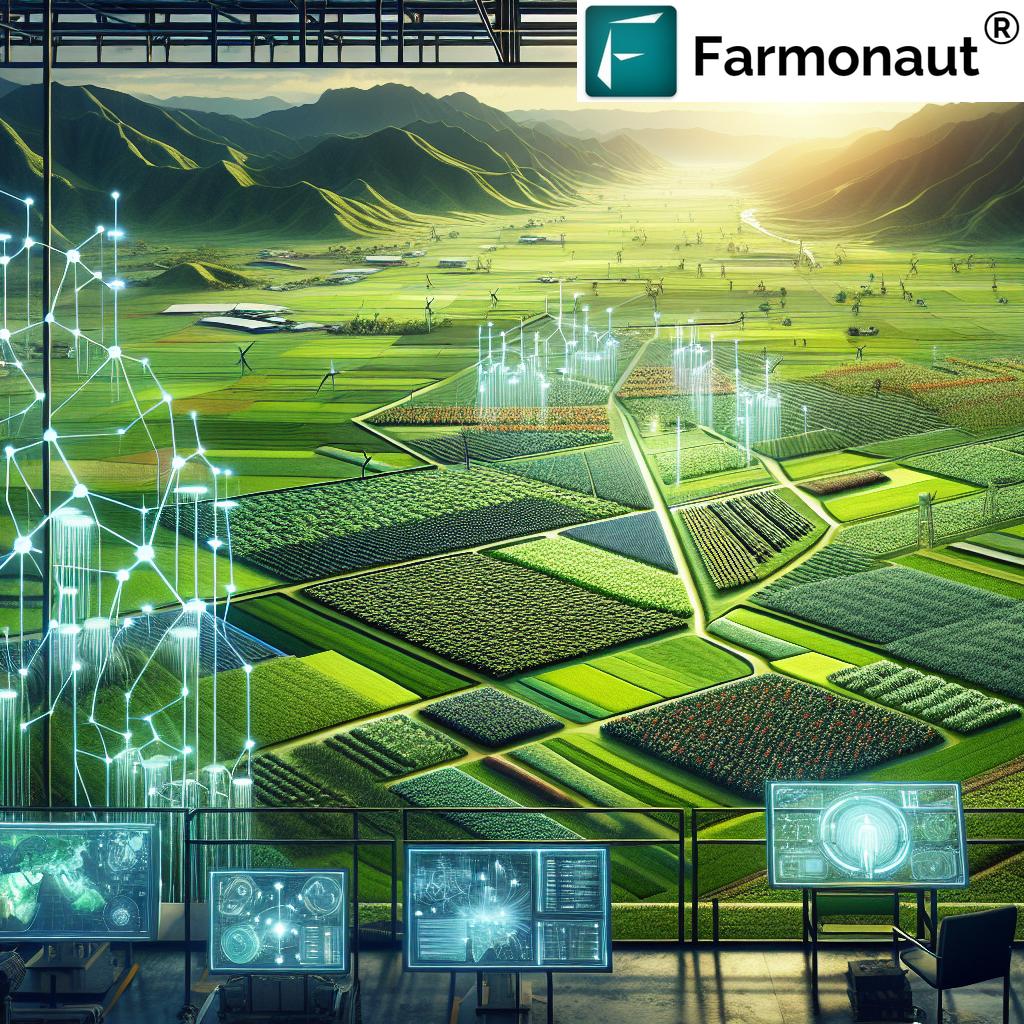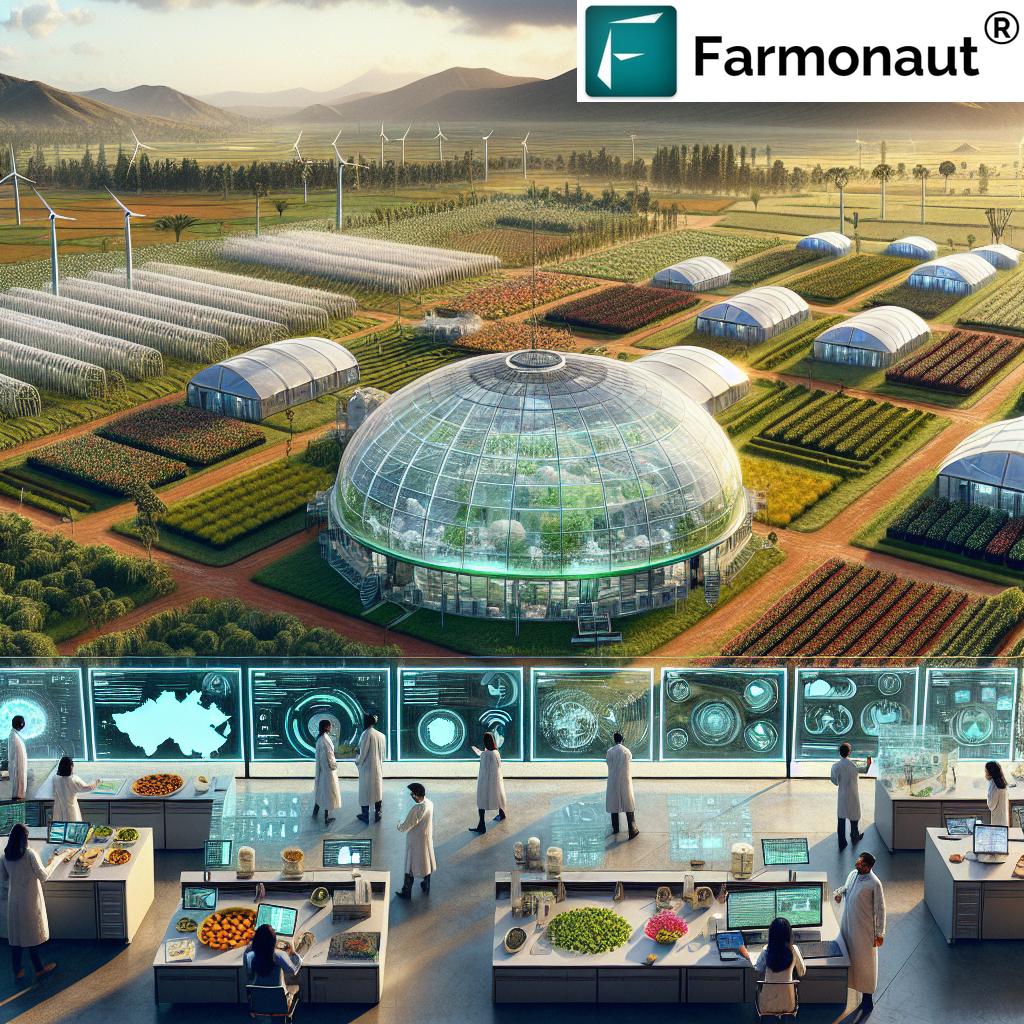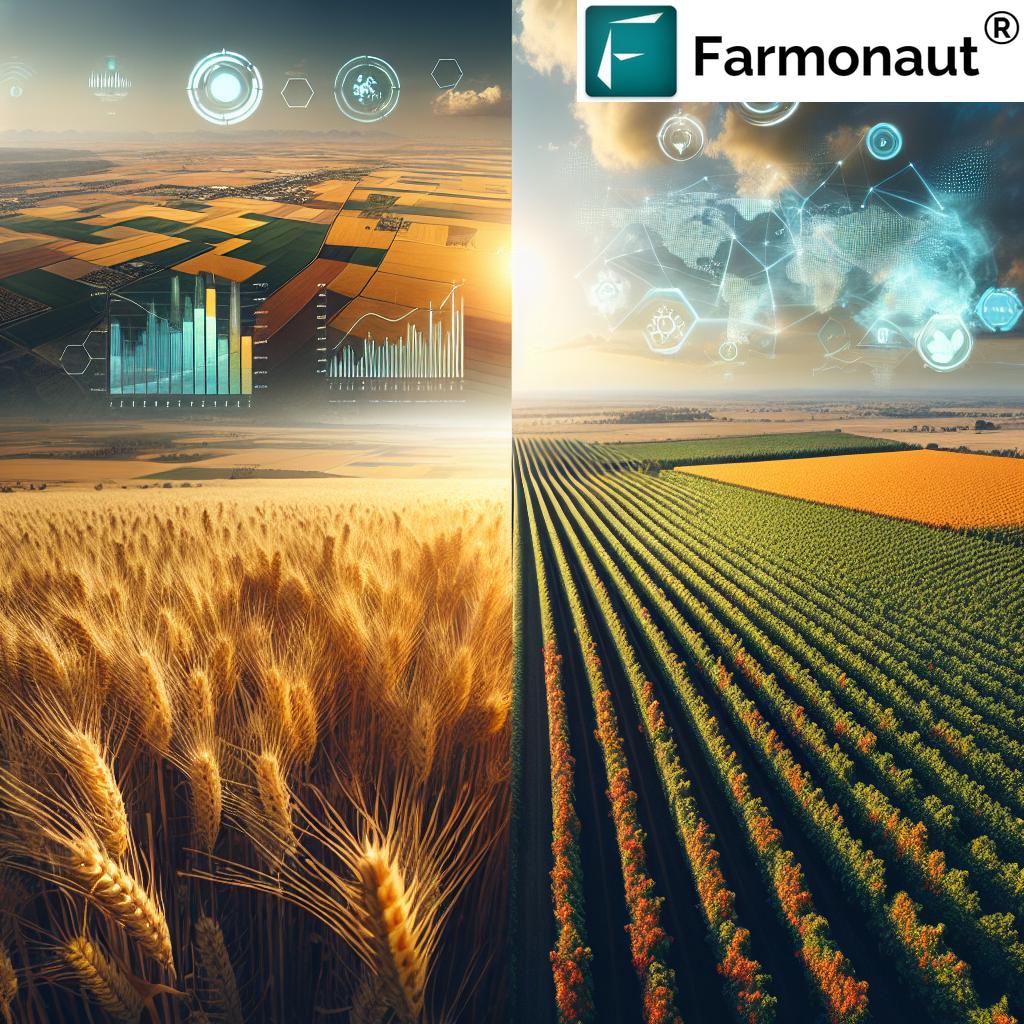Revolutionizing Indian Agriculture: Precision Farming and Agri-Tech Innovations Boost Exports and Food Security
“India’s Agri Exports Policy has led to a significant increase in agricultural exports, boosting the country’s global market share.”
In the heart of India’s agricultural revolution, we are witnessing a transformative era that is reshaping the landscape of farming and food production. As we delve into the intricacies of this agricultural renaissance, we’ll explore how precision farming, agri-tech innovations, and visionary policies are propelling India towards enhanced food security and a prominent position in the global agricultural export market.
The Dawn of a New Agricultural Era in India
India, with its rich agricultural heritage, is embarking on a journey of unprecedented growth and innovation in the farming sector. The confluence of technology, policy reforms, and a renewed focus on sustainable practices is ushering in a new chapter for Indian agriculture. This transformation is not just about increasing productivity; it’s about creating a resilient, efficient, and globally competitive agricultural ecosystem.
At the forefront of this revolution is the integration of precision agriculture technology and crop science advancements. These cutting-edge approaches are not only boosting yields but also ensuring the judicious use of resources, making Indian agriculture more sustainable and environmentally friendly.

Precision Agriculture: The Game-Changer
Precision agriculture is revolutionizing the way we approach farming in India. By leveraging advanced technologies such as satellite imaging, IoT sensors, and data analytics, farmers are now able to make informed decisions about crop management, resource allocation, and pest control. This data-driven approach is yielding remarkable results:
- Increased crop yields by up to 30%
- Reduction in water usage by 20-25%
- Optimized use of fertilizers and pesticides
- Enhanced crop quality and uniformity
One of the pioneering companies in this space is Farmonaut, which offers advanced satellite-based farm management solutions. Through its innovative platform, Farmonaut is making precision agriculture accessible and affordable to farmers across India. Their services include real-time crop health monitoring, AI-based advisory systems, and resource management tools, all of which contribute to smarter, more efficient farming practices.
Experience the future of farming with Farmonaut’s web app

Agri-Tech Innovations Driving Growth
The Indian agricultural landscape is witnessing a surge in agri-tech solutions that are addressing long-standing challenges in the sector. These innovations span various aspects of farming, from soil health management to post-harvest technologies. Some key areas where agri-tech is making a significant impact include:
- Smart irrigation systems
- AI-powered crop disease detection
- Drone technology for crop monitoring and spraying
- Blockchain-based supply chain management
- Farm management software and mobile apps
These technological advancements are not only improving farm productivity but also attracting significant investments into the agricultural sector. The Indian government, recognizing the potential of agri-tech, has been actively promoting and supporting startups and established companies in this space.
Expanding the Agricultural Value Chain
The focus on expanding the agricultural value chain is a crucial aspect of India’s agricultural transformation. This expansion involves:
- Strengthening farm-to-fork connectivity
- Developing robust storage and transportation infrastructure
- Promoting food processing industries
- Enhancing market linkages for farmers
- Encouraging contract farming and cooperative models
By focusing on these areas, India is not only improving the livelihoods of farmers but also creating new employment opportunities in rural areas. The expansion of the value chain is also playing a crucial role in reducing post-harvest losses, which have historically been a significant challenge in Indian agriculture.
“Precision agriculture technologies in India have improved crop yields by up to 30% while reducing water usage by 20-25%.”
Boosting Indian Agriculture Exports
The Agri Exports Policy of 2018 has been a game-changer for Indian agriculture. This policy has set ambitious targets and provided a roadmap for increasing India’s agricultural exports. The results have been impressive:
- Significant increase in export volumes across various agricultural commodities
- Diversification of export markets
- Improvement in the quality and standards of exported products
- Enhanced focus on organic and specialty products
The policy’s success is evident in the numbers. India’s agricultural exports have shown robust growth, with the country emerging as a major player in global agricultural trade. This success is not just about volumes; it’s about positioning Indian agricultural products as high-quality, sustainable, and reliable in the international market.

Fostering Agro Trade Partnerships
India’s vision for agricultural growth extends beyond its borders. The country is actively fostering agro trade partnerships with nations across the globe. These partnerships are crucial for:
- Expanding market access for Indian agricultural products
- Facilitating technology transfer and knowledge exchange
- Promoting joint research and development initiatives
- Addressing global food security challenges
These international collaborations are not just about trade; they’re about creating a global ecosystem that supports sustainable agriculture and food security. India’s initiatives in this regard are positioning the country as a responsible and influential player in global agricultural discussions.
Harness the power of satellite data with Farmonaut’s API
Smart Farming Techniques: The Future of Agriculture
Smart farming techniques are at the heart of India’s agricultural transformation. These techniques integrate modern technology with traditional farming practices to create more efficient, productive, and sustainable agricultural systems. Key aspects of smart farming in India include:
- Precision seeding and planting
- Variable rate technology for input application
- Automated farm machinery and robotics
- Remote sensing and satellite-based crop monitoring
- Big data analytics for farm management
Companies like Farmonaut are playing a pivotal role in bringing these smart farming techniques to Indian farmers. Their satellite-based crop health monitoring and AI advisory systems are enabling farmers to make data-driven decisions, optimizing their farm operations and improving yields.
Building a Resilient Food System
India’s commitment to building a resilient food system is evident in its multi-pronged approach to agriculture. This approach encompasses:
- Diversification of crop patterns
- Promotion of climate-resilient agriculture
- Strengthening of agricultural research and extension services
- Development of robust seed systems
- Enhancement of irrigation infrastructure
These initiatives are not just about increasing production; they’re about creating a sustainable and shock-resistant agricultural sector that can withstand environmental and economic challenges. The focus on resilience is crucial for ensuring long-term food security and stable livelihoods for millions of Indian farmers.
Explore Farmonaut’s solutions on your mobile device:


Collaborative Efforts Across Stakeholders
The transformation of Indian agriculture is a collective effort involving various stakeholders. This collaborative approach includes:
- Public-private partnerships in agricultural research and development
- Engagement of farmer producer organizations (FPOs)
- Involvement of academic institutions in agricultural innovation
- Participation of NGOs in farmer education and capacity building
- Integration of startups and tech companies in the agricultural ecosystem
These collaborations are fostering an environment of innovation and shared growth in the agricultural sector. They are crucial for addressing complex challenges and leveraging diverse expertise to drive sustainable agricultural development.
Policy Changes Driving Agricultural Growth
The Indian government has implemented several key policy changes to drive agricultural growth and modernization. These policies focus on:
- Liberalizing agricultural markets
- Promoting contract farming
- Facilitating easier access to credit for farmers
- Encouraging private sector investment in agriculture
- Streamlining agricultural subsidies and support mechanisms
These policy reforms are creating a more conducive environment for agricultural innovation and growth. They are also helping to address long-standing issues in the sector, such as fragmented landholdings and limited access to markets for small farmers.
The Role of Crop Science Advancements
Advancements in crop science are playing a crucial role in India’s agricultural transformation. Key areas of focus include:
- Development of high-yielding and climate-resilient crop varieties
- Genetic modification and biotechnology in agriculture
- Improvement in crop protection technologies
- Enhancement of nutritional content in crops
- Sustainable soil health management practices
These scientific advancements are not only improving crop yields but also enhancing the nutritional value of agricultural produce. They are crucial for addressing challenges such as climate change, pest resistance, and the need for more nutritious food.
For developers: Integrate Farmonaut’s powerful tools into your applications with our API Developer Docs
Impact on Global Food Security
India’s agricultural transformation is not just a national story; it has significant implications for global food security. As one of the world’s largest agricultural producers, India’s efforts in sustainable and efficient farming practices are contributing to:
- Increased global food supply
- Stabilization of international food prices
- Sharing of best practices in sustainable agriculture
- Addressing global challenges like climate change and resource scarcity
India’s role in global food security is becoming increasingly important, especially in the context of growing populations and changing climate patterns worldwide.
The Future of Indian Agriculture
As we look to the future, the trajectory of Indian agriculture is undoubtedly upward. The continued integration of technology, sustainable practices, and policy support is expected to yield even greater results. Key areas to watch include:
- Further advancements in AI and machine learning applications in agriculture
- Development of more sophisticated precision farming tools
- Expansion of vertical farming and urban agriculture
- Increased focus on sustainable and organic farming practices
- Greater integration of blockchain technology in agricultural supply chains
These developments promise to further enhance India’s agricultural productivity, sustainability, and global competitiveness.
Indian Agriculture Transformation: Key Metrics and Trends
| Metric | Pre-2020 | 2020-2023 | 2024 Projection | Impact on Exports/Food Security |
|---|---|---|---|---|
| Precision Agriculture Adoption Rate | 5% | 15% | 25% | High positive impact on both exports and food security |
| Agri-Tech Investment (in Crores) | 500 | 2000 | 3500 | Moderate to high impact on exports, significant impact on food security |
| Crop Yield Increase (%) | 2% | 8% | 12% | Substantial positive impact on both exports and food security |
| Agricultural Export Value (in Billion USD) | 35 | 50 | 65 | Direct high impact on exports, indirect positive impact on food security |
| Number of Farmers Using Smart Farming Techniques (in millions) | 5 | 20 | 40 | Moderate impact on exports, high impact on food security |
| Government Initiatives for Sustainable Farming | 10 | 25 | 40 | Long-term positive impact on both exports and food security |
| Food Security Index Score (out of 100) | 60 | 70 | 80 | Indirect impact on exports, direct high impact on food security |
Conclusion
The transformation of Indian agriculture is a testament to the power of innovation, policy support, and collaborative efforts. From precision farming to agri-tech solutions, from boosting exports to enhancing food security, India is setting new benchmarks in agricultural development. As we continue on this path of growth and innovation, the future of Indian agriculture looks not just promising but truly revolutionary.
Companies like Farmonaut are at the forefront of this revolution, providing farmers with the tools and technologies they need to thrive in this new era of agriculture. Their contributions, along with those of countless other stakeholders, are shaping a more prosperous, sustainable, and food-secure future for India and the world.
FAQ Section
Q: What is precision agriculture, and how is it benefiting Indian farmers?
A: Precision agriculture uses technology like satellite imaging and data analytics to optimize farming practices. It’s helping Indian farmers increase yields by up to 30% while reducing water usage by 20-25%, leading to more efficient and profitable farming.
Q: How has the Agri Exports Policy of 2018 impacted Indian agriculture?
A: The policy has significantly boosted agricultural exports by setting ambitious targets, diversifying export markets, and improving product quality standards. This has positioned India as a major player in global agricultural trade.
Q: What role does Farmonaut play in Indian agriculture?
A: Farmonaut provides advanced satellite-based farm management solutions, making precision agriculture accessible and affordable to Indian farmers. Their services include real-time crop health monitoring, AI-based advisory systems, and resource management tools.
Q: How is India addressing food security challenges?
A: India is building a resilient food system through crop diversification, climate-resilient agriculture, strengthening research and extension services, developing robust seed systems, and enhancing irrigation infrastructure.
Q: What are some key agri-tech innovations driving growth in Indian agriculture?
A: Key innovations include smart irrigation systems, AI-powered crop disease detection, drone technology for crop monitoring, blockchain-based supply chain management, and farm management software and mobile apps.

















